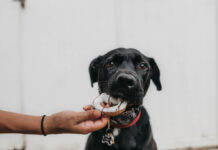Last Updated on December 13, 2020
Dogs are naturally sociable creatures. Meaning, you would expect them to approach other dogs whenever they’re outside or even indoors, by a visiting friend’s dog or a neighbor’s dog. And guess what, dogs are unpredictable creatures and you might be taken by surprise thanks to their varying reactions to different situations or other dogs.
It happens in a flash. One moment your dog is playing with another dog or simply sniffing it, and the next thing you hear is a pained yelp or whimper.
Dogs bite when they’re feeling threatened, scared, or startled. It is simply an instinctual response to different triggers.
While some dogs may cower or run away because of such emotions, others can get aggressive or attack when they feel that their space has been invaded or when they misinterpret another dog breed’s attempt at friendliness. Regardless, if you are a dog parent you should be aware of what to do if your pooch gets bitten by another dog as well as of the potential dangers that biting might pose.
Dog bites can be extremely serious, what with rabies, etc., and may even cause instant death in severe situations such as damage to the neck or throat.
That is why you should be fully prepared for anything and never neglect your pet when they’re in the presence of other animals.
Read on to find out about what to do if your dog gets bitten by another dog.
1. Don’t panic
First of all, try not to freak out; it is the first step to handle the situation. It is true that seeing your dog in pain would bring you pain as well. But panicking would also make your dog panic even more if the injury is not even that serious.
Try to calm yourself and observe your dog’s predicament. Check for any blood and if there is none, watch the way they walk after the bite and if they can’t walk or move, make sure to carry them and call the vet immediately.
Just be careful as your dog might bite you when they’re distressed and still shaken by the attack against them.
2. Get your dog’s wound assessed
It is very easy for a dog to get an infection from injuries or bites from other animals or insects, especially if the dog is not vaccinated or their vaccine is not up-to-date.
In fact, the bite may look small when it is actually deeper than it looks or even fatal, especially if the dog is nicked by a stray dog or even a pet dog. So, it is highly advised that you have your bitten dog checked by a veterinarian no matter the depth or severity of the wound.
While on your way to the vet, handle your dog gently and check their neck, face, head, abdomen, legs, and paws, and apply an antibiotic ointment to the affected area as first-aid to soothe the wound.
3. Treat the dog bite
If your dog gets bitten but you’re in a situation where you can’t get to the vet sooner, yet you at least have a first aid kit to treat your dog’s wound, use it.
It is recommended that you use an antibacterial solution or ointment such as Neosporin to disinfect your dog’s wound. Or, if you don’t have any of those, use sterile saline or hydrogen peroxide by applying them to gauze and covering your dog’s wound with it.
You may also use natural remedies such as essential oils, brewed herbal tea, garlic, onions, or any remedy antibacterial properties that can help fight off infection and which your dog is also not allergic to.
4. Seek emergency care
In the more serious cases, you should head straight for an emergency clinic rather than attend to your dog’s wounds at home or wait for the vet.
Here is when to know that your bitten dog needs to go to the ER:
your dog has difficulty breathing
If your dog is coughing excessively
If your dog discharges pink frothy or foamy liquid
If your dog is panting constantly/hyperventilating
If your dog has white gums
If your dog is bleeding
If your dog can’t stand or walk
If your dog is losing consciousness
Though most dog bites aren’t fatal and can be treated, the risk is still there, which is why you are advised to seek medical care for your dog anyway.
5. Get your dog vaccinated
The dog bite may not be deep or instantly deadly but if it was inflicted by an infected dog (i.e: rabid dog), the fatality risk is higher. Here is where the importance of vaccinations comes.
Get vaccine shots for your dog to prevent any deadly infections or diseases. Some of the primary vaccinations that all dogs should get include rabies vaccine, canine hepatitis vaccine, Kennel cough vaccine, Parvovirus vaccine, and Lyme disease vaccination.
Those are the most common and safe vaccines that your puppy or dog should get to prevent viral infections from tick bites or contact with other dogs, especially bites.
Lastly, if you’re a new dog parent, don’t forget to prepare pet insurance since, much like health insurance for people, dog insurance will help cover many of your dog’s expenses including medical emergencies.






















